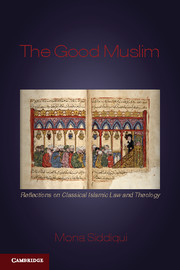Book contents
- Frontmatter
- Contents
- Acknowledgements
- Introduction
- 1 Spoken, Intended, and Problematic Divorce in Hanafī Fiqh
- 2 Between Person and Property: Slavery in Qudūrī’s Mukhtaṣar
- 3 Pig, Purity, and Permission in Mālikī Slaughter
- 4 Drinking and Drunkenness in Ibn Rushd
- 5 Islamic and Other Perspectives on Evil
- 6 The Language of Love in the Qur’ān
- 7 Virtue and Limits in the Ethics of Friendship
- Glossary
- Bibliography
- Index
Introduction
Published online by Cambridge University Press: 05 July 2012
- Frontmatter
- Contents
- Acknowledgements
- Introduction
- 1 Spoken, Intended, and Problematic Divorce in Hanafī Fiqh
- 2 Between Person and Property: Slavery in Qudūrī’s Mukhtaṣar
- 3 Pig, Purity, and Permission in Mālikī Slaughter
- 4 Drinking and Drunkenness in Ibn Rushd
- 5 Islamic and Other Perspectives on Evil
- 6 The Language of Love in the Qur’ān
- 7 Virtue and Limits in the Ethics of Friendship
- Glossary
- Bibliography
- Index
Summary
Modern scholars have sometimes noted that attitudes towards the nature of truth and the extent to which truth is to be disseminated among society at large were very different in medieval Islamic society from what they are in the Modern West. Medieval Muslim thinkers of various schools, both orthodox and heterodox, tended to think that society was inevitably divided into an elite which was capable of understanding the full truth and a majority of persons who were not capable of such understanding.
(Nikki Keddie)An interesting question about the Islamic intellectual tradition is who were the scholars of the formative and classical period writing for? Maybe just for each other, maybe there was no one audience, or maybe this is a very modern question. Modern understanding of scholarship inquires after originality, sources, and influence. Very often the modern audience is assumed to be secular and liberal, rather than confessional or literalist. In the Western academic tradition we delineate disciplines of scholarship, as much as for establishing the parameters of scholarly excellence as for our own sense of epistemological direction and focus. In addition to this question, we must also ask how was the knowledge and learning of early Muslim scholars imparted? Since the 1980s there has been much progress regarding the question of oral and written transmission of knowledge in early Islam, that is, the first three centuries of Islam. Drawing upon the works of several Western scholars, Sebastian Günther explains how the scholarly sessions (majālis) held by Muslim scholars for the purpose of teaching their students, relied largely on oral and aural instruction. Written materials in the form of collections of data and ‘lecture scripts’ were used as memory aids and, in the course of time, these collections came to be fixed in memory and writing. However, the concept of a book did not gain shape in early Muslims scholarship, although scholars exercised authorial creativity through their selection and arrangement of themes as well as displaying a sophisticated method of internal referencing in various written forms. They produced different kinds of written collections and notes, many of which were used by their students for the composition of their own works. Günther writes, ‘Interestingly enough, these lecture scripts and written collections of data from the first three centuries of Islam seem to make up the majority of the “sources” used by authors of later times when composing their often voluminous compilations.’
- Type
- Chapter
- Information
- The Good MuslimReflections on Classical Islamic Law and Theology, pp. 1 - 9Publisher: Cambridge University PressPrint publication year: 2012



